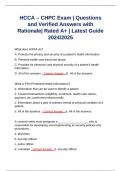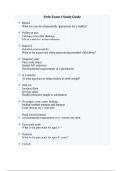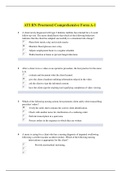Exam (elaborations)
HCCA – CHPC Exam | Questions and Verified Answers with Rationale| Rated A+ | Latest Guide 2024/2025
- Course
- Institution
HCCA – CHPC Exam | Questions and Verified Answers with Rationale| Rated A+ | Latest Guide 2024/2025 HCCA – CHPC Exam | Questions and Verified Answers with Rationale| Rated A+ | Latest Guide 2024/2025
[Show more]






